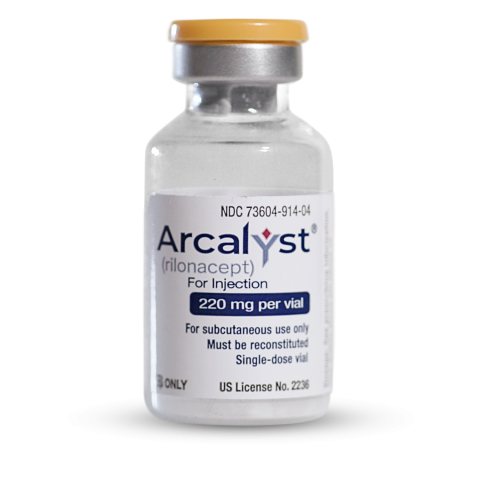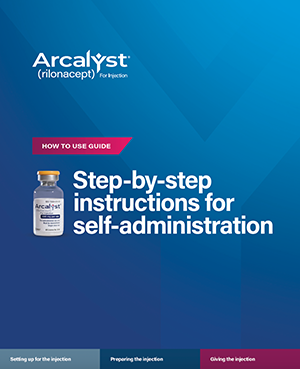ARCALYST (rilonacept)
A treatment for Cryopyrin-Associated Periodic Syndromes (CAPS)
WHAT ARE CAPS?
CAPS are a group of rare, hereditary autoinflammatory disorders. They are inherited in an autosomal dominant pattern, which means that a mutation in 1 copy of the gene is enough to cause the disorder.
- Both males and females are equally affected.
- The estimated incidence in the United States is 1 to 2 cases per million people.
CAPS are characterized by lifelong recurrent symptoms of rash, fever/chills, joint pain, eye redness/pain, and fatigue.
- The symptoms of CAPS may be challenging to diagnose.
- The diagnosis may be delayed because CAPS are rare and the symptoms often resemble those of other disorders.
- Intermittent symptom flares may be triggered anytime by cooling temperatures, stress, exercise, or unidentified causes. Some patients may try to reduce their symptoms by avoiding things that trigger the disease.
Please visit the Autoinflammatory Alliance to learn more about CAPS.
About ARCALYST

ARCALYST is a prescription medicine called an interleukin-1 (IL-1) blocker. ARCALYST is used to treat adults and children 12 years of age and older with Cryopyrin-Associated Periodic Syndromes (CAPS), including Familial Cold Autoinflammatory Syndrome (FCAS) and Muckle-Wells Syndrome (MWS).
DOSING AND ADMINISTRATION
ARCALYST is a once-weekly
self-administered subcutaneous injection



Your first injection of ARCALYST will be given with the help of a healthcare provider in the doctor’s office or with support from an ARCALYST Nurse Educator.
Do not try to give yourself ARCALYST injections until you are sure that you understand how to prepare and inject your dose.
The recommended dose for CAPS is shown below.
It is important to use ARCALYST exactly as prescribed by your healthcare provider.
Adults (18 years and older)
Starter doses:
320 mg
given as two 2-mL injections of 160 mg each
Weekly maintenance dose:
160 mg
given as a once-weekly 2-mL injection
Adolescents (12 to 17 years)
Starter doses:
4.4 mg/kg
given as 1 or 2 injections, up to a
maximum of 320 mg (up to 2 mL)
Weekly maintenance dose:
2.2 mg/kg
given as a once-weekly injection,
up to a maximum of 160 mg (up to 2 mL)
After your first injection of ARCALYST, you will self-administer a once-weekly injection.
Step-by-step administration
Resources to help guide you
In addition to what you have learned from your healthcare provider or ARCALYST Nurse Educator, the resources below can help you better understand how to prepare and inject ARCALYST.
Step-by-step injection video

Learn more about how
to use ARCALYST.
Frequently Asked Questions
Find the answers you need
You may have some questions about treatment with ARCALYST. Whether you are considering starting or already taking ARCALYST, we are here to help guide you through some frequently asked questions and provide you with the answers you are looking for. As always, be sure to discuss your treatment options with your healthcare provider and contact Kiniksa OneConnect™ at 1-833-KINIKSA
(1-833-546-4572) with further questions and for finding support.
ARCALYST is a once-weekly, self-administered treatment.
ARCALYST is given by injection under the skin (subcutaneous injection) 1 time each week. A healthcare provider will tell you how much ARCALYST to take. Kiniksa OneConnect can work with you to set up one-on-one injection training sessions with an ARCALYST Nurse Educator so you are familiar with the administration process. Do not try to give yourself ARCALYST injections until you are sure that you understand how to prepare and inject your dose. Call your healthcare provider, pharmacist, or Kiniksa OneConnect at 1-833-KINIKSA (1-833-546-4572) if you have any questions.
Keep ARCALYST in the carton it comes in to protect it from light. Store ARCALYST in the refrigerator between 36 °F and 46 °F (2 °C and 8 °C). Refrigerated ARCALYST can be used until the expiration date printed on the vial and carton. ARCALYST may be kept at room temperature after mixing and should be used within 3 hours of mixing.
If you miss a dose, you should speak with your healthcare provider.
Give yourself the injection within 7 days from the missed dose and then resume your original schedule. If the missed dose is not given within 7 days, give yourself the dose, starting a new schedule based on this date.
Your Patient Access Lead will help you coordinate the delivery of your medication and supplies through Kiniksa OneConnect.
Before starting treatment with ARCALYST, tell the healthcare provider if you or your child:
- Think you have an infection.
- Are being treated for an infection.
- Have signs of an infection, such as fever, cough, or flu-like symptoms.
- Have any open sores on your body.
- Have a history of infections that keep coming back.
- Have asthma. People with asthma may have an increased risk of infection.
- Have diabetes or an immune system problem. People with these problems have a higher chance for infections.
- Have tuberculosis (TB), or if you have been in close contact with someone who has had tuberculosis.
- Have or have had HIV, hepatitis B, or hepatitis C.
- Take other medicines that affect your immune system.
Before you or your child begin treatment with ARCALYST, talk with the healthcare provider about your or your child’s vaccine history. Ask the healthcare provider whether you or your child should receive any vaccines, including the pneumonia vaccine and flu vaccine, before you or your child begin treatment with ARCALYST.
Tell your healthcare provider about all the medicines you take, including prescription and over-the-counter medicines, vitamins, and herbal supplements. Especially tell your healthcare provider if you take other medicines that affect your immune system, such as corticosteroids. You should not take medicines that block tumor necrosis factor (TNF), such as Enbrel® (etanercept), Humira® (adalimumab), or Remicade® (infliximab), while you are taking ARCALYST. You should also not take other medicines that block interleukin-1 (IL-1), such as Kineret® (anakinra), while taking ARCALYST. Taking ARCALYST with any of these medicines may increase your risk of getting a serious infection.
Talk to your healthcare provider if you experience any side effects that bother you or that do not go away. Please report side effects by contacting Kiniksa Pharmaceuticals toll-free at 1-833-546-4572, Option 3 or contact FDA at 1-800-FDA-1088 or www.fda.gov/medwatch.
It is not known if ARCALYST will harm your unborn child or if it can pass into your breast milk. Tell your healthcare provider right away if you become pregnant while taking ARCALYST and talk about the best way to feed your baby during treatment with ARCALYST.
ARCALYST can affect your immune system. ARCALYST can lower the ability of your immune system to fight infections. Serious infections, including life-threatening infections and death have happened in patients taking ARCALYST. Taking ARCALYST can make you more likely to get infections, including life-threatening serious infections, or may make any infection that you have worse.
You should not begin treatment with ARCALYST if you have an infection or have infections that keep coming back (chronic infection).
After starting ARCALYST, if you get an infection, show any sign of an infection including a fever, cough, flu-like symptoms, or have any open sores on your body, call your healthcare provider right away. Treatment with ARCALYST should be stopped if you get a serious infection.
Kiniksa OneConnect is a support program made up of a team of dedicated Patient Access Leads who provide personalized one-on-one support at each step of your treatment journey with ARCALYST. You can find services to help you with starting treatment, financial assistance, and treatment support. You can contact Kiniksa OneConnect at 1-833-KINIKSA (1-833-546-4572) Monday-Friday (8 AM – 8 PM ET).
ARCALYST Nurse Educators are qualified personnel who can assist you with in-person or virtual administration training to help you better understand the self-injection process.
We are a team of experienced individuals,
with knowledge of insurance plans and healthcare networks,
known as Patient Access Leads.
Patient Access Leads
Once you are enrolled in Kiniksa OneConnect, you will be paired with a dedicated Patient Access Lead to receive personalized one-on-one support throughout your entire treatment experience.
While your healthcare provider is your go-to resource for all of your medical needs, we have unique expertise to help navigate:
- Insurance coverage and benefits investigation
- The prior authorization process
- Treatment logistics
- Options for injection training
- Ongoing education and support
Starting Treatment
After your healthcare provider submits a Kiniksa OneConnect Enrollment Form with your signature and consent, our work begins. We will help to make starting treatment a seamless experience.

Understanding your insurance coverage
We will guide you through the insurance process by helping explain your coverage and by partnering with your healthcare provider to assist in the case a prior authorization is needed.
If eligible, we may be able to help you begin treatment while you are waiting for an insurance coverage determination.
Injection training
After coordinating your first treatment shipment, we’ll work with you to set up one-on-one virtual or injection sessions with an ARCALYST Nurse Educator. They can provide guidance and training on the injection process.
Financial assistance
Our programs are designed to help eligible
patients remove barriers to treatment.

Kiniksa Copay Assistance Program
If you are eligible, the Kiniksa Copay Assistance Program may be able to help lower out-of-pocket costs related to receiving treatment, such as copays, coinsurance, and deductibles to as little as $10 per month.*
*To be eligible for the Kiniksa Copay Assistance Program, you must have commercial insurance, must not have Medicare, Medicaid, or other government insurance, and must meet other eligibility criteria. You also must agree to the rules set forth in the terms and conditions for the program. Please visit kiniksapolicies.com/copay to review additional eligibility criteria.
Patient Assistance Program
If you struggle with high out-of-pocket costs, do not have insurance, or find that your treatment is not covered by insurance, our Patient Assistance Program may be able to help. We will work with you to see if you qualify for this program and discuss any questions you may have.†
†To be eligible for the Kiniksa Patient Assistance Program, you must meet certain financial eligibility requirements. Please visit kiniksapolicies.com/pap to review additional eligibility criteria.
Treatment support
Our work doesn’t end after treatment begins. We want you to feel supported
every step of the way.

Product shipping
We partner with select specialty pharmacies to provide refill reminders and deliver prescriptions directly to your door. These specialty pharmacies also provide access to items, such as sharps disposal containers to ensure that you have the necessary supplies for each injection.
Product support
We can assist you with product-related questions and provide access to educational tools and resources for additional information about your treatment.
Resources and support
Throughout your treatment journey, we will check in with you to make sure we’re staying up to date on your needs. If there are any changes in your situation (new insurance, a change of address, upcoming travel, etc.), we can help you find ways to avoid treatment interruptions. If you need additional information and support, we can also direct you to patient advocacy and support groups.

